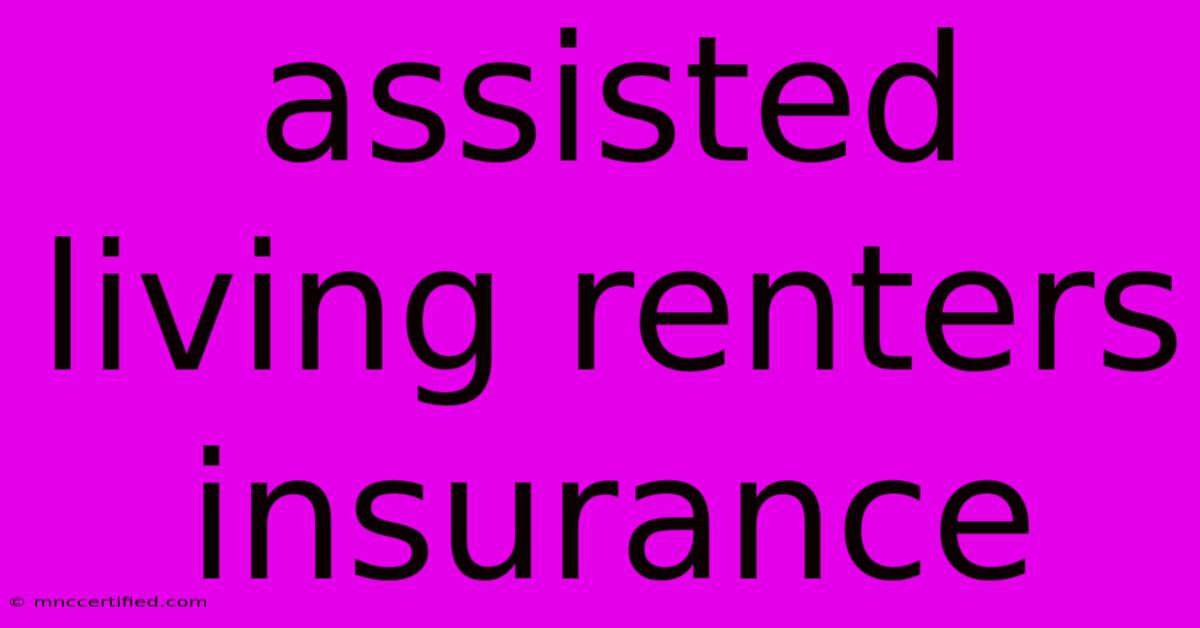Assisted Living Renters Insurance

Table of Contents
Assisted Living Renters Insurance: Protecting Your Belongings and Peace of Mind
Choosing assisted living is a significant decision, focusing on care and well-being. However, it's crucial not to overlook protecting your personal assets. This comprehensive guide explores the importance of renters insurance in assisted living facilities and helps you navigate the process of finding the right coverage.
Why Renters Insurance is Essential in Assisted Living
While assisted living facilities provide a supportive environment, they generally don't cover the loss or damage of your personal belongings. A fire, theft, or water damage event could leave you with significant financial burdens replacing clothing, furniture, electronics, and other valuable items. Assisted living renters insurance acts as a safety net, protecting your financial investment and providing peace of mind.
Key Coverages to Consider:
-
Personal Property Coverage: This is the cornerstone of renters insurance. It protects your belongings from various perils, including fire, theft, vandalism, and even some weather-related events. Consider creating a detailed inventory of your possessions with photos or videos for accurate claims processing.
-
Liability Coverage: This covers accidental injuries or property damage caused to others within your assisted living apartment. For example, if a guest slips and falls, liability coverage could help cover medical expenses.
-
Additional Living Expenses: If a covered event makes your apartment uninhabitable, this coverage helps pay for temporary housing, meals, and other essential expenses while repairs are underway. This is especially crucial in assisted living, where finding suitable temporary accommodations can be challenging.
-
Medical Payments Coverage: This helps cover medical expenses for guests who are injured in your apartment, regardless of fault.
Finding the Right Assisted Living Renters Insurance Policy:
Shopping for the right policy requires careful consideration.
1. Assess Your Needs:
Begin by creating a detailed inventory of your possessions. This will help you determine the appropriate coverage amount for your personal property. Consider the value of your electronics, jewelry, and other high-value items.
2. Compare Quotes:
Obtain quotes from multiple insurers. Don't solely focus on price; compare coverage options and policy details. Look for reputable companies with positive customer reviews.
3. Check for Exclusions:
Carefully review the policy's exclusions. Some policies may exclude certain types of damage or specific items. Understanding these exclusions will help you make an informed decision.
4. Consider the Facility's Insurance:
While your renters insurance protects your belongings, understand the facility's insurance coverage. They may have liability coverage for common areas, but this won't cover your personal property.
5. Review Your Existing Policies:
If you already have a renters or homeowners insurance policy, check if it extends to assisted living. You might be able to add an endorsement rather than buying a separate policy.
Frequently Asked Questions (FAQs):
-
Q: How much does assisted living renters insurance cost? A: Costs vary based on coverage amount, location, and the insurer. Expect to pay a relatively affordable monthly premium.
-
Q: Is assisted living renters insurance mandatory? A: It's not legally mandated in most places, but highly recommended to protect your valuable possessions.
-
Q: What happens if I move to a different assisted living facility? A: Notify your insurer immediately. They may require an update to your policy based on the new location.
Protecting Your Future: The Value of Peace of Mind
Investing in assisted living renters insurance is a small price to pay for the significant peace of mind it provides. It safeguards your financial security and allows you to focus on enjoying this new chapter of your life, without the added worry of unexpected losses. By understanding your coverage options and carefully selecting a policy, you can ensure your belongings are protected and you can maintain your financial stability. Remember to regularly review and update your policy to reflect any changes in your possessions or circumstances.

Thank you for visiting our website wich cover about Assisted Living Renters Insurance. We hope the information provided has been useful to you. Feel free to contact us if you have any questions or need further assistance. See you next time and dont miss to bookmark.
Featured Posts
-
Liechtenstein Vs San Marino Match Prediction
Nov 19, 2024
-
Laon Watch News Tavares In Portugal
Nov 19, 2024
-
European Travel Insurance Ukraine
Nov 19, 2024
-
Rum Sodomy And The Lash Pogues Tour
Nov 19, 2024
-
How Much Is Title Insurance In Pa
Nov 19, 2024